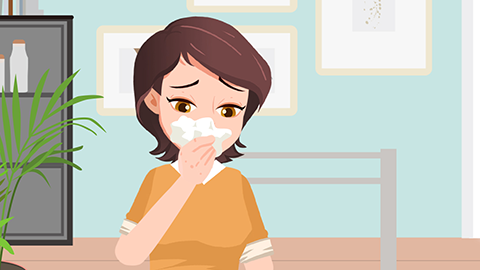Why does nasal congestion persist after receiving a vaccine?
Generally, persistent nasal congestion after vaccination may be caused by the vaccine-induced immune response, individual allergic constitution, catching a chill leading to a cold, worsening of rhinitis symptoms, nasal mucosa congestion, and other reasons. It is recommended to seek timely medical attention to identify the exact cause and receive symptomatic treatment under a physician's guidance. Detailed analysis is as follows:

1. Vaccine-induced immune response: The vaccine stimulates the immune system to mount a response, causing temporary congestion and swelling of the nasal mucosa in some individuals, resulting in nasal blockage, often accompanied by mild fatigue. No special treatment is required; drink plenty of warm water to promote metabolism, maintain indoor air circulation, and avoid strenuous exercise. Symptoms usually subside within 1-2 days.
2. Individual allergic constitution: Individuals with allergic constitutions may be sensitive to vaccine components, triggering allergic reactions in the nasal passages, causing persistent nasal congestion accompanied by sneezing and runny nose. Avoid exposure to other allergens such as pollen and dust mites. Follow a physician's instructions to use medications such as Cetirizine Hydrochloride Tablets, Loratadine Syrup, or Mometasone Furoate Nasal Spray to relieve allergy symptoms.
3. Catching a chill leading to a cold: Immunity may temporarily fluctuate after vaccination, making individuals more susceptible to catching a chill and developing a cold. Nasal mucosal congestion and swelling can cause nasal blockage, often accompanied by sore throat and cough. Patients may follow medical advice to use medications such as Ganmaoling Granules, Compound Paracetamol and Amantadine Tartrate Tablets, or Pseudoephedrine Hydrochloride Nasal Drops. It is also important to stay warm and get sufficient rest to recover physical strength.
4. Worsening of rhinitis symptoms: Individuals with chronic rhinitis might experience symptom exacerbation after vaccination, with persistent nasal congestion and mucus discharge. Follow a physician's instructions to use medications such as Budesonide Nasal Spray, Tongqiao Biyan Tablets, or Montelukast Sodium Chewable Tablets to control inflammation. Additionally, use normal saline to rinse the nasal cavity and maintain nasal hygiene.
5. Nasal mucosa congestion: Excipients in the vaccine may stimulate nasal blood vessels to dilate, causing mucosal congestion and nasal blockage, possibly accompanied by a sensation of heat in the nasal area. Applying a warm towel compress to the nose can help promote local blood circulation and relieve congestion. Avoid forceful nose-blowing to prevent mucosal damage. If necessary, use Naphazoline Hydrochloride Nasal Drops as directed by a physician to constrict blood vessels.
After vaccination, keep warm and avoid going to crowded places. Maintain nasal moisture by using a humidifier to regulate indoor humidity. Follow a light diet and avoid spicy or irritating foods to reduce nasal mucosal irritation and aid in alleviating nasal congestion symptoms.







